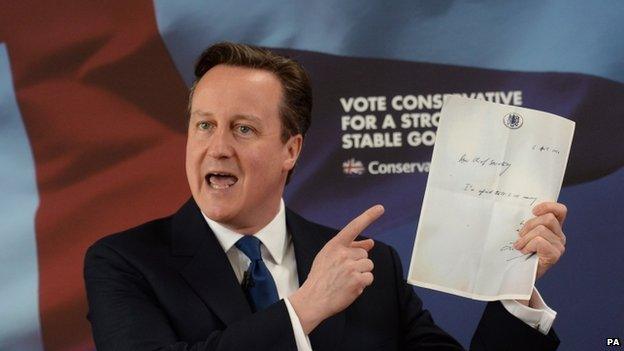Election result: How David Cameron's Conservatives won it
- Published

David Cameron focused on two key messages while campaigning
One thing is rock-solid true: the Conservatives who worked on this campaign are as surprised by the result as the pollsters, pundits, politicians and general population.
Maybe they shouldn't be - the economy is in good shape and the Conservatives had incumbency advantage.
But when I travelled back from the prime minster's last rally with a group of exhausted Conservative campaign officials it was clear that 290 seats was a hoped-for target.
No one talked about anything over 300 seats, and no-one even mentioned an overall majority.
So what special sauce pushed David Cameron into No 10 with a Commons majority?
Let's not forget that the so-called 'short' campaign of five-and-a-half weeks was the end of a campaign, not its beginning.
For months the Conservatives, with the Tory press in lockstep, had been tearing at Ed Miliband's character.
Voters may have been pleasantly surprised to find that in April he could both walk and chew gum, but it would take more than five weeks of that to erode David Cameron's incumbency advantage.
And over the same period the Conservative economic message had been hammered home over and over again.
Status quo bias
Journalists may have wanted to push pencils into their ears every time they heard the phrase "long-term economic plan" but they weren't the target.
Campaigns are legendarily won or lost on the economy.
"It's the economy, stupid" is the Clinton campaign slogan engraved on the heart of every politician and commentator.

David Cameron constantly warned of the dangers of Nicola Sturgeon's SNP
This one was a little different. Because in-depth polling revealed that even if voters felt good about the economy, it didn't translate into support for the Conservatives.
But what does pay off is, to be blunt, scaring voters.
People might say they want an uplifting and forward-looking campaign.
But we are hard-wired to be more concerned about losing something we have than we are enthused about gaining something in the future.
Behavioural psychologists call it the "endowment effect, external" or "status quo bias". And campaign strategists exploit it to the full.
Simple messages
David Cameron had two simple messages in the campaign and he rarely veered away from them; the first - the economy is in good shape and the recovery is threatened by Labour. And the second - the SNP would hold a Labour-led government to ransom.
The "ransom argument" exploited a rising tide of English nationalism - when I went out canvassing in a west London marginal, concern over Labour-SNP was the only national campaign theme to make it to the doorsteps.

US political strategist James Carville coined the phrase: "It's the economy, stupid"
The economic argument exploited the endowment effect to the full.
You might not credit the government for the recovery, but you certainly don't want the hard won gains of the past few years chucked away with a risk-laden vote for Labour.
In vain did Labour try and chip away at the fear-mongering.
But all the triple locks on spending and ludicrous #edstone gimmicks couldn't get round the Conservative messaging: you are risking the hard-won recovery if you vote Labour.
It might have made for a thin, negative and corrosive campaign.
But it worked a treat. The most successful political party in the democratic world has proved its mettle, again.